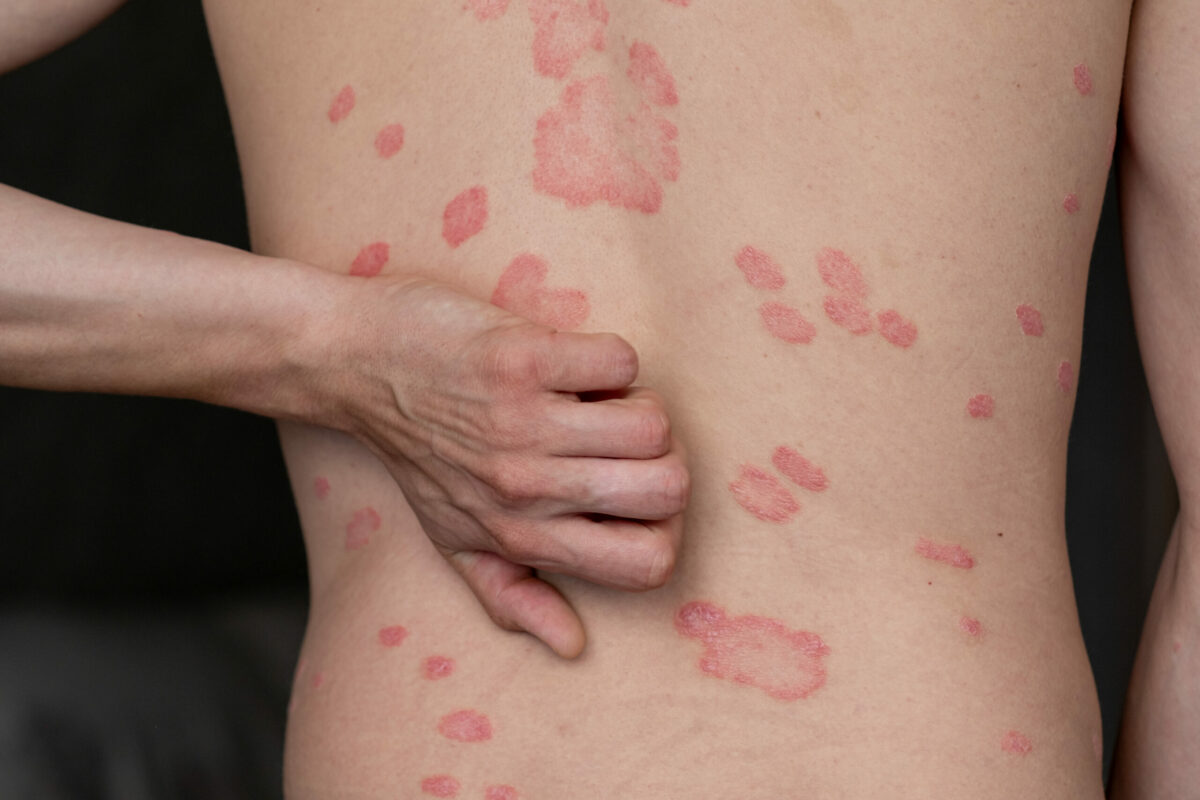Urticaria is also known as hives and it is a skin condition that provokes itchy spots of different sizes. This skin problem can be caused by different substances and situations (including medicines and foods).
Moreover, angioedema can appear along with hives or alone and it provokes swelling in the deep skin layers. It often appears on the face and lips. Commonly, acute hives and angioedema appear simultaneously but are harmless and may clean up within several days even without treatment. In any case, if you experience hives more than 6 weeks consecutively you may have chronic hives.
Healthcare providers usually prescribe antihistamine medicine to treat hives and angioedema. Sometimes, angioedema can block your airways due to tongue or throat swelling, which can be life-threatening.
Symptoms
Hives
- Red or purplish welts on the skin
- Mild or persistent itchiness
- Oval or round worm-shaped welts
- Small or large spots on the skin
While acute hives last several days, chronic hives may last from months to years.
Angioedema
The following symptoms are similar to hives but occur in deep layers of the skin. Angioedema can appear alone or along with hives. Check below some symptoms:
When Should I Visit a Doctor?
Most people treat angioedema or hives alone at home but if symptoms last more than 3-4 days, you should see a physician for treatment. Sometimes, you may experience hives or angioedema due to an allergic reaction to foods or medicines. Get medical help right away if you experience swelling of the lips, tongue, mouth, or throat, or you experience breathing problems.
Causes
There are many cases that doctors cannot identify the exact cause of angioedema and hives. However, people usually experience urticaria in the following cases. For example:
- Foods – These foods commonly trigger this skin problem including shellfish, fish, peanuts, tree nuts, soy, eggs, and milk.
- Medicines – For example Penicillins, Aspirin, Ibuprofen, Naproxen sodium, and blood pressure drugs.
- Allergens – Pollen and other allergens that you breathe in also can provoke hives.
- Insect bites and infections – Acute hives and angioedema also happen in people who experience insect bites and certain infections.
Risk Factors
Some people may be at higher risk of developing angioedema and hives. For example:
- Other allergic reactions
- Have had urticaria before
- Family history of hereditary angioedema and hives
What are The Possible Urticaria Complications?
This skin problem usually does not provoke any complications. In any case, if you experience swelling of the tongue or throat, it may block the airway. It usually occurs due to angioedema and it is life-threatening.
Diagnosis
Commonly, healthcare professionals perform a physical examination to determine whether you have hives and angioedema or not. In case they are not sure, you may need to do a blood test or allergy skin test.
Treatment
Usually, people with mild symptoms do not require treatment. If you experience intense itching and discomfort due to symptoms, you should see a doctor. Check below some treatment options:
Medicines
- Anti-itch medicines – Antihistamines are usually the primary treatment for hives and angioedema. These help to lessen swelling, itching, and other allergic symptoms. Anti-itch medications are available in either prescription or over-the-counter forms.
- Immune system suppressants – If you do not notice any improvements while using antihistamines, you may get a prescription for medications that affect the immune system.
- Medicines used for hereditary angioedema – Physicians usually prescribe certain medications if you have a family history of angioedema. These drugs help to reduce the symptoms and maintain a normal protein level in the blood to prevent future symptoms.
- Anti-inflammatory drugs – Doctors prescribe these medicines in severe cases of hives or angioedema. You will receive a short treatment with an oral corticosteroid medicine (such as Prednisone) to lessen inflammation, swelling, and itchiness.
Lifestyle Changes
The following tips are helpful to reduce hives and angioedema symptoms. Examples include:
- Try to avoid triggers including foods, medicines, pet dander, pollen, latex, and insect bites.
- It is advised to use an over-the-counter anti-itch medicine including Loratadine, Cetirizine, or Diphenhydramine.
- You can also cover the affected area with a cold washcloth for several minutes. Therefore, it helps to soothe the skin and prevent scratching.
- A cool shower or bath can be a good relief from itching. Moreover, some people also add in the cool water baking soda or oatmeal powder. It temporarily reduced the itching.
- You should not wear tight, scratchy, or rough clothes.
- Regularly apply sun protection, especially when outdoors.
Prevention
To decrease the chance of getting urticaria, you can consider the following precautions. Examples include:
- Try to avoid triggers
- If you are in contact with pollen or animals, you should change your clothes and take a bath.
Frequently Asked Questions
What is the primary urticaria treatment?
Healthcare professionals often prescribe oral antihistamine medication to treat hives and angioedema. These include Hydroxyzine, Diphenhydramine, Chlorpheniramine, and Cyproheptadine.
What are foods that could trigger hives and angioedema?
- Meat (including smoked or processed meats, sausages, and others)
- Dairy (such as aged cheeses, yogurt, sour cream, and others)
- Vegetables (for example, tomatoes, eggplant, and avocado)
- All fruits and fruit juices
Consult with your doctor for more details.
What is the best way to cure urticaria?
- Try to avoid triggers
- Use over-the-counter medicines to reduce itching
- Have cold baths
- Weak loose cloths
- Limit your exposure to the sun or apply sun protection when outdoors
If you have any other questions, ask your physician.




